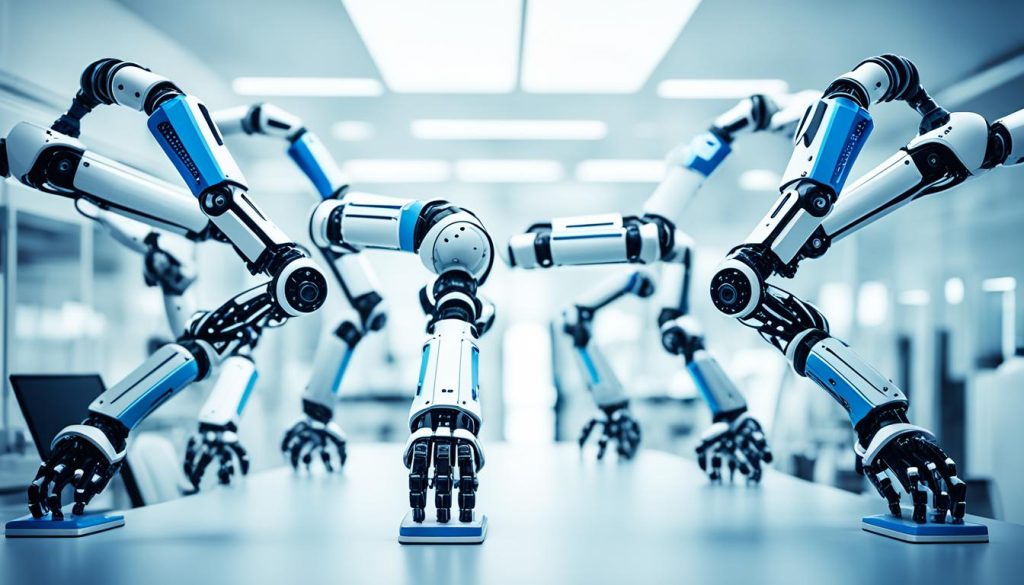IBM, a global leader in technology and innovation, has embraced cutting-edge strategies to drive growth, adaptability, and customer experience in an ever-changing business landscape. With a strong focus on data and AI, IBM has revolutionized its supply chain and transformed its business development approach.
IBM’s corporate strategy revolves around leveraging technology to answer disruptions and manage resiliency effectively. A key outcome of this strategy is the development of a cognitive supply chain that leverages data and AI to lower costs, exceed customer expectations, and automate non-value add work. IBM Consulting played a pivotal role in driving this transformation, using Design Thinking methods and fostering agility throughout the organization.
The cognitive supply chain is powered by the IBM Cognitive Supply Chain Advisor 360 Solution, running on IBM Hybrid Cloud and Red Hat OpenShift software. This technology enables real-time supply chain visibility, allows for quick responses to changes in demand, and simplifies supplier management. The integration of these technologies has empowered IBM to make data-driven decisions and gain insights across the entire supply chain.
Key Takeaways:
- IBM has embraced cutting-edge technology to drive growth and adaptability.
- The cognitive supply chain is powered by data and AI, enabling cost reduction and improved customer experience.
- IBM Consulting played a crucial role in driving the transformation and fostering agility.
- The IBM Cognitive Supply Chain Advisor 360 Solution enables real-time visibility and simplifies supplier management.
- Integration of technologies has enhanced data-driven decision-making across the supply chain.
The Transformative Power of Cutting-Edge Technologies in Business
Technology is evolving at a rapid pace, and its impact on businesses is nothing short of transformative. Cutting-edge technologies such as Artificial Intelligence (AI), Automation, Blockchain, Internet of Things (IoT), Augmented Reality (AR), and Digital Adoption are revolutionizing the way businesses operate and thrive in the digital era.
AI and Automation have emerged as game-changers, offering businesses the ability to streamline operations, improve efficiencies, and reduce costs. With AI, businesses can automate repetitive tasks, make accurate predictions based on data analysis, and enhance decision-making processes. Automation, on the other hand, allows for increased productivity, reduced human error, and improved scalability.
Blockchain technology has gained prominence for its potential to secure transactions, streamline supply chains, and enhance transparency. Its decentralized nature ensures that data remains secure and tamper-proof, making it an ideal solution for industries such as finance, healthcare, and logistics.
The Internet of Things (IoT) connects everyday objects to the internet, enabling remote monitoring, data collection, and automation. This technology has the potential to disrupt industries such as manufacturing, transportation, and healthcare, by enabling real-time insights, predictive maintenance, and enhanced customer experiences.
Augmented Reality (AR) offers businesses the opportunity to create immersive experiences for their customers. By overlaying digital information onto the physical world, businesses can provide interactive product demonstrations, virtual try-ons, and improved customer support.
Digital adoption is another critical aspect of business transformation. Embracing digital technologies allows businesses to leverage the power of AI, Automation, Blockchain, IoT, and AR to unlock new revenue streams, enhance customer engagement, and stay ahead of the competition.
Overcoming Challenges and Realizing the Potential
While the transformative power of these technologies is evident, there are challenges that businesses must overcome to fully realize their potential. Skilled personnel are in high demand, and businesses need to invest in training or recruit individuals with the expertise needed to harness these technologies effectively. Additionally, the initial investment required to implement these technologies may be a barrier for some businesses.
However, the potential rewards of adopting these technologies far outweigh the risks. Businesses that embrace AI, Automation, Blockchain, IoT, AR, and digital adoption can streamline their operations, reduce costs, drive innovation, and deliver enhanced customer experiences.
Furthermore, the evolution of technology has made these cutting-edge solutions more accessible and scalable, enabling small and medium-sized enterprises (SMEs) to embark on their digital transformation journeys and compete with larger organizations.
It is essential for businesses to stay updated with the latest technological advancements and collaborate with industry experts to navigate the ever-evolving digital landscape. By harnessing the transformative power of these cutting-edge technologies, businesses can propel themselves forward, drive growth, and thrive in the digital age.
The Potential of Cutting-Edge Technologies
| Technology | Potential Benefits |
|---|---|
| AI | Automated processes, data-driven decision-making, improved accuracy |
| Automation | Increased productivity, reduced human error, scalability |
| Blockchain | Secure transactions, enhanced transparency, streamlined supply chains |
| IoT | Real-time insights, predictive maintenance, enhanced customer experiences |
| AR | Immersive experiences, interactive product demonstrations, improved customer support |
| Digital Adoption | New revenue streams, improved customer engagement, competitive advantage |
Real-World Transformations: Case Studies
Several companies have successfully leveraged cutting-edge technologies to drive transformation. These case studies demonstrate the tangible benefits and impact that digital transformation, AI integration, and automation can have on businesses. Let’s take a closer look at three prominent examples: Tesla, Amazon, and Maersk.
Tesla: Revolutionizing the Automotive Industry
Tesla Motors, led by visionary entrepreneur Elon Musk, has been at the forefront of digital transformation in the automotive industry. By integrating AI and automation into its operations, Tesla has revolutionized electric vehicle manufacturing and customer experience. Through the use of advanced robotics and machine learning algorithms, Tesla’s factories have achieved higher efficiency, accuracy, and quality in production processes. The implementation of AI also enables autonomous driving capabilities, making Tesla vehicles safer and more intelligent.
“At Tesla, we believe in the power of technology to redefine the automotive industry. Our focus on digital transformation, AI integration, and automation has allowed us to push the boundaries of innovation and deliver exceptional products and experiences to our customers.” – Elon Musk, CEO of Tesla

Amazon: Redefining Retail and Logistics
Amazon, the world’s largest online retailer, has leveraged AI, IoT, and automation to redefine retail and logistics. The company’s advanced recommendation systems, powered by AI algorithms, personalize the shopping experience for millions of customers. Additionally, Amazon’s fulfillment centers utilize automation solutions to optimize order processing and packaging, enabling fast and efficient delivery. IoT technology plays a crucial role in inventory management, ensuring timely restocking and minimizing stockouts. Through these digital transformations, Amazon has set new benchmarks in customer satisfaction and operational efficiency.
“Harnessing the potential of cutting-edge technologies like AI, IoT, and automation has allowed us to create a seamless shopping experience and enable efficient logistics operations. At Amazon, we are committed to constantly innovating and raising the bar in the digital era.” – Jeff Bezos, Founder and CEO of Amazon
Maersk: Enhancing Transparency and Efficiency in Supply Chain
Maersk, a global leader in container shipping, has embraced Blockchain technology to enhance transparency and efficiency in its supply chain. By using distributed ledger technology, Maersk has improved visibility and traceability of shipments, reducing paperwork and minimizing the risk of fraud. This digital transformation has streamlined logistics operations and enabled more efficient collaboration among stakeholders. With Blockchain, Maersk has set new standards for supply chain management and paved the way for increased trust and security in global trade.
“Embracing digital technologies like Blockchain is pivotal to creating a more transparent and efficient supply chain ecosystem. Maersk’s digital transformation journey has showcased the immense benefits and transformative power of cutting-edge technologies.” – Søren Skou, CEO of Maersk
These case studies highlight the immense potential of digital transformation, AI integration, and automation in driving business growth and innovation. By leveraging these technologies, companies like Tesla, Amazon, and Maersk have not only achieved operational excellence but also set industry benchmarks for others to follow.
Key Partners for Digital Transformation
Choosing the right development partner is crucial for SMEs embarking on digital transformation. It’s important to collaborate with AI development companies that have a proven track record and offer comprehensive AI services. These companies bring expertise in machine learning, natural language processing, and data analytics, which are essential components of successful digital transformation strategies.
Cubix

- Cubix is a leading AI development company known for providing innovative and scalable solutions for businesses across various industries. They specialize in developing AI-powered applications that leverage advanced technologies to drive digital transformation.
IBM Watson
IBM Watson is a pioneer in AI development and offers a wide range of services and tools to help businesses harness the power of AI. With their expertise in AI, natural language processing, and machine learning, IBM Watson enables organizations to unlock valuable insights and make data-driven decisions.
Google Cloud AI
Google Cloud AI provides businesses with cutting-edge AI solutions that leverage the extensive capabilities of their cloud platform. With their expertise in AI and machine learning, Google Cloud AI helps organizations optimize their operations, enhance customer experiences, and drive innovation.
Microsoft AI
Microsoft AI empowers businesses to transform their operations and deliver personalized experiences to customers. Their AI solutions leverage advanced algorithms and machine learning techniques to improve productivity, automate processes, and enable intelligent decision-making.
Amazon Web Services (AWS) AI
Amazon Web Services (AWS) AI offers a comprehensive suite of AI services that enable businesses to build, train, and deploy machine learning models at scale. From computer vision to natural language understanding, AWS AI empowers organizations to unlock the full potential of their data.
Salesforce Einstein
Salesforce Einstein is an AI platform designed to enhance customer relationship management and drive business growth. By leveraging AI and machine learning, Salesforce Einstein enables organizations to deliver personalized experiences, automate tasks, and make data-driven decisions.
SAS AI
SAS AI provides businesses with advanced analytics and AI solutions that enable them to derive valuable insights from their data. With their expertise in AI, machine learning, and data analytics, SAS AI helps organizations optimize processes, improve decision-making, and drive innovation.
Accenture AI
Accenture AI is a global leader in AI and offers a range of services to help businesses unlock the value of AI. Their AI solutions enable organizations to automate processes, enhance customer experiences, and drive growth through innovative and scalable AI applications.
Infosys Nia
Infosys Nia is an AI-powered platform that helps businesses accelerate their digital transformation journey. With their expertise in AI, machine learning, and automation, Infosys Nia enables organizations to improve operational efficiency, enhance customer experiences, and drive innovation.
Wipro HOLMES
Wipro HOLMES is an AI and automation platform that helps businesses streamline their operations and drive digital transformation. With their AI and automation capabilities, Wipro HOLMES enables organizations to automate tasks, optimize processes, and improve overall efficiency.
These top AI development companies, including Cubix, IBM Watson, Google Cloud AI, Microsoft AI, AWS AI, Salesforce Einstein, SAS AI, Accenture AI, Infosys Nia, and Wipro HOLMES, offer a wealth of expertise and services to support SMEs on their digital transformation journey. By partnering with these companies, organizations can leverage the power of AI to drive innovation, gain a competitive edge, and achieve their business objectives.
Looking Ahead: Statistics and Predictions
The adoption of AI and automation technologies is expected to increase significantly in the coming years. By 2025, it is projected that **85% of businesses** will have implemented these technologies. This highlights the growing recognition of the potential of AI and automation in transforming various industries.
Another area with immense growth potential is the **global IoT market**. It is projected to reach a staggering value of **$1.1 trillion** by 2026. This signifies the increasing demand for IoT solutions and the opportunities it presents for businesses in the digital era.
These statistics emphasize the importance for businesses to stay ahead by harnessing the potential of AI, automation, and IoT technologies. Adopting these technologies can drive efficiency, streamline processes, and unlock innovative solutions, contributing to overall growth and competitiveness in the digital era.
To fully comprehend the impact of these statistics, let’s explore some real-world examples and case studies that demonstrate the successful integration of cutting-edge technologies in various industries.
Conclusion
In conclusion, IBM’s business strategy revolves around innovation and embracing cutting-edge technology. Their success in leveraging these technologies to drive digital transformation in their supply chain is evident. By collaborating with top AI development companies, IBM has fueled their digital transformation and positioned themselves as a leader in the industry.
As the world continues to evolve, businesses must recognize the strategic value of technology and the need to embrace change. Collaboration with the right partners is crucial for staying competitive and driving growth. The rapid pace of technological advancements requires businesses to be agile, adaptable, and open to innovation.
To thrive in the digital era, organizations must prioritize digital transformation and integration of technology into their operations. By embracing change and continuously seeking ways to improve and innovate, businesses can stay ahead in the competitive landscape and meet the evolving needs of their customers.
FAQ
What is IBM’s business strategy?
What are the key components of IBM’s corporate strategy?
How has IBM used technology to transform its supply chain?
What are some real-world examples of companies leveraging cutting-edge technologies?
Which AI development companies are recommended for digital transformation?
What are the predictions for the adoption of AI and automation technologies?
What is the expected growth of the global IoT market?
What is IBM’s business strategy?
What are the key components of IBM’s corporate strategy?
How has IBM used technology to transform its supply chain?
What are some real-world examples of companies leveraging cutting-edge technologies?
Which AI development companies are recommended for digital transformation?
What are the predictions for the adoption of AI and automation technologies?
What is the expected growth of the global IoT market?
FAQ
What is IBM’s business strategy?
IBM’s business strategy revolves around innovation and embracing cutting-edge technologies to drive growth and adaptability.
What are the key components of IBM’s corporate strategy?
IBM focuses on leveraging technologies such as AI, automation, blockchain, IoT, and augmented reality to streamline operations and unlock new revenue streams.
How has IBM used technology to transform its supply chain?
IBM has developed a cognitive supply chain that extensively uses data and AI technology to lower costs, exceed customer expectations, automate non-value add work, and improve the overall supply chain experience.
What are some real-world examples of companies leveraging cutting-edge technologies?
Companies like Tesla, Amazon, and Maersk have successfully integrated AI, automation, and blockchain into their operations, revolutionizing their respective industries and enhancing efficiency and transparency.
Which AI development companies are recommended for digital transformation?
SMEs should consider partnering with top AI development companies like Cubix, IBM Watson, Google Cloud AI, Microsoft AI, Amazon Web Services (AWS) AI, Salesforce Einstein, SAS AI, Accenture AI, Infosys Nia, and Wipro HOLMES, which have extensive experience and expertise in various industries.
What are the predictions for the adoption of AI and automation technologies?
It is projected that 85% of businesses will have implemented AI and automation technologies by 2025, highlighting the significant growth potential and the importance of staying ahead in the digital era.
What is the expected growth of the global IoT market?
The global IoT market is expected to reach
FAQ
What is IBM’s business strategy?
IBM’s business strategy revolves around innovation and embracing cutting-edge technologies to drive growth and adaptability.
What are the key components of IBM’s corporate strategy?
IBM focuses on leveraging technologies such as AI, automation, blockchain, IoT, and augmented reality to streamline operations and unlock new revenue streams.
How has IBM used technology to transform its supply chain?
IBM has developed a cognitive supply chain that extensively uses data and AI technology to lower costs, exceed customer expectations, automate non-value add work, and improve the overall supply chain experience.
What are some real-world examples of companies leveraging cutting-edge technologies?
Companies like Tesla, Amazon, and Maersk have successfully integrated AI, automation, and blockchain into their operations, revolutionizing their respective industries and enhancing efficiency and transparency.
Which AI development companies are recommended for digital transformation?
SMEs should consider partnering with top AI development companies like Cubix, IBM Watson, Google Cloud AI, Microsoft AI, Amazon Web Services (AWS) AI, Salesforce Einstein, SAS AI, Accenture AI, Infosys Nia, and Wipro HOLMES, which have extensive experience and expertise in various industries.
What are the predictions for the adoption of AI and automation technologies?
It is projected that 85% of businesses will have implemented AI and automation technologies by 2025, highlighting the significant growth potential and the importance of staying ahead in the digital era.
What is the expected growth of the global IoT market?
The global IoT market is expected to reach $1.1 trillion by 2026, indicating the immense opportunities for businesses to harness IoT technology for improved operations and efficiency.
What should businesses focus on to drive growth in the digital era?
Businesses should focus on embracing innovation, staying adaptable to change, and collaborating with the right partners to leverage cutting-edge technologies and drive growth in the digital era.
.1 trillion by 2026, indicating the immense opportunities for businesses to harness IoT technology for improved operations and efficiency.
What should businesses focus on to drive growth in the digital era?
Businesses should focus on embracing innovation, staying adaptable to change, and collaborating with the right partners to leverage cutting-edge technologies and drive growth in the digital era.




No comments! Be the first commenter?